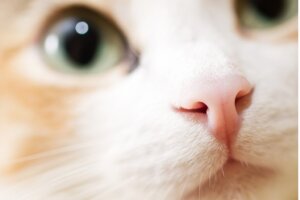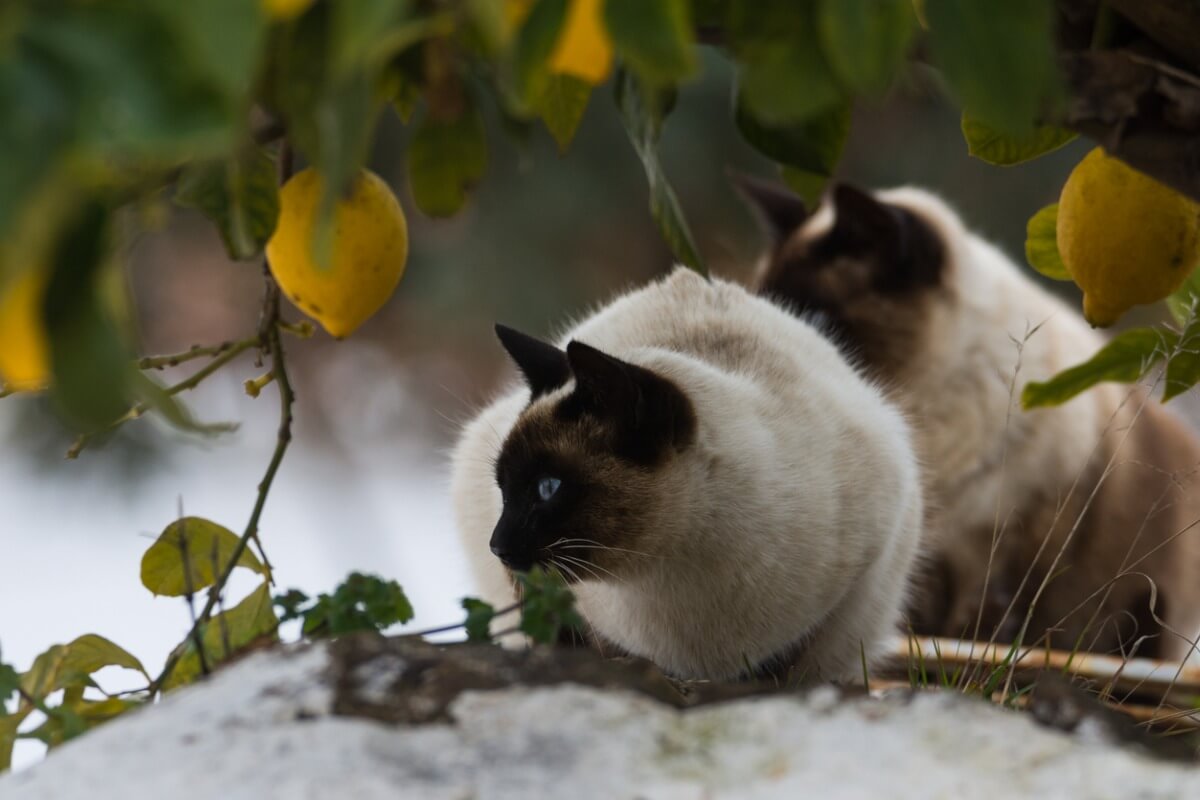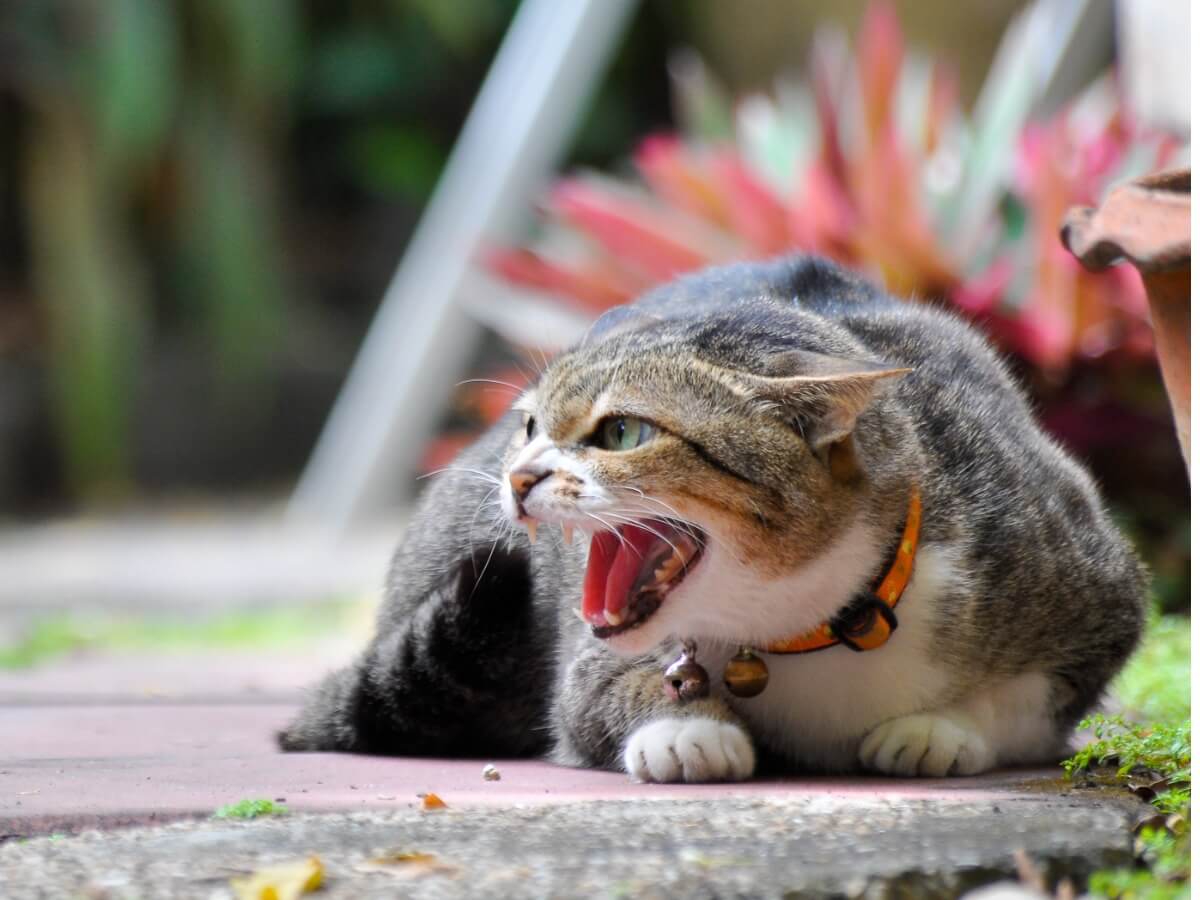12 Smells Cats Hate


Written and verified by the biologist Samuel Sanchez
Although they aren’t famous for it, domestic cats have quite an impressive sense of smell. It’s up to 14 times more sensitive than a human being and they have twice as many receptor cells in their nose, so it isn’t surprising that they can perceive aromas that, for us, are just air. However, this is also a double-edged sword for them, as there are certain smells that cats hate and that humans don’t even notice.
Domestic cats are routine beings that are easily stressed, so you have to be very careful with the odors your pet is exposed to in the long term. Next up, we’ll tell you about 12 smells that your cat won’t want to go near!
1. Citrus
The term “citrus” refers to the fruits produced by trees of the genus Citrus. Among all of them, limes, lemons, oranges, and mandarins stand out. Although they’re an excellent snack for humans, we know that cats detest the aroma emitted by citrus fruits.
Much of this aversion can be attributed to citric acid, an organic tricarboxylic compound with a strong acid taste that gives these fruits some of their appeal to humans. As indicated by professional websites, the disgust that cats have for citrus fruits can be used to advantage by the tutor in some scenarios.
Putting some orange peels in the places that you do not want the cat to frequent is a very natural way to repel it.

2. Eucalyptus
The term “eucalyptus” refers to various trees and shrubs in the Myrtaceae family. As indicated by the American Society for the Prevention of Cruelty to Animals (ASPCA), this vegetable not only displeases felines with its aroma, but can also poison them if there is an accidental ingestion of the leaves.
The consumption of eucalyptus leaves causes nausea, hypersalivation and apathy in cats.
3. Bananas
Bananas are an excellent dietary supplement for humans, but they can produce smells that cats hate. It’s believed that this reaction is due to the chemicals emitted by the skin of the banana, as it has also been reported as toxic in the feline world.
4. Mustard
Whether in the form of a sauce or in seeds, mustard is a condiment with a very strong aroma and flavor. It isn’t surprising that cats avoid it, because, as we have said in previous lines, they’re capable of perceiving odors in a much more sensitive way than human beings.
5. Cinnamon
This is the same as in the previous case: either due to its acidity or its sweetness, cats usually reject any seasoning with a strong aroma. Therefore, it’s always recommended to give the animal food without any type of spice if you cook it at home.
6. Menthol
Menthol is a saturated secondary alcohol found in the oils of some peppermint species (especially Mentha arvensis). This is another smell that cats hate, luckily for their owners. Since they associate their scent with cleaning household chemicals, they’re most likely not going to be interested in air fresheners, scrubbers, and other poisonous items.
7. Pine
You have to be careful with this smell, as there are substrates for the sandbox with the aroma of pine and other “fresh” trees. It’s possible that your cat will accept this litter type when it’s time to relieve itself, but rejection shouldn’t be ruled out due to its strong smell. In general, felines prefer to relieve themselves in unscented litter boxes.
8. Dirty litter box
Cats are extremely neat animals and they hate dirt and its smells. Therefore, it isn’t surprising that they’re repelled by a dirty litter box, and that they stop using it over time. It is the guardian’s obligation to keep this area sanitized, as this will prevent conflictive behaviors and unwanted infections in the house cat.
9. Cleaning products
As you may have seen, many of the smells that cats hate are associated with cleanliness and freshness in the human world (citrus, pine, eucalyptus and mint). Because they make people feel fresh and renewed, these scents are standard in most household cleaning products.
Cat aversion to this is both good and bad: They won’t try to drink cleaning fluid, but they may stop using a toy or litter box if they have been cleaned with strong-scented disinfectants. For this reason, it’s always recommended to use odorless products when sanitizing the animal’s environment.
10. Rotten food
Cats are much more capable of detecting rotting food than humans. In addition, as the predatory animals that they are, they reject all food that has been sitting for more than a few hours. Be careful and keep the garbage bags closed, as they could stress your feline with their scent.
11. Essential oils
Essential oils are highly concentrated plant-derived chemicals with a high aromatic index. It’s not surprising that these are also one of the smells that cats hate, because their organoleptic power is increased even more.
In addition to the rejection of smell, essential oils can cause poisoning in the cat after ingestion.
12. Other cats
The smell of cats is another of the aromas that domestic cats detest, especially if the domestic animal hasn’t been socialized in the proper way during its kitten stage. It isn’t that the other cat’s smell is unpleasant in itself, but rather that the cat can take it as an “assault on its territory” and reject contact with the new member.

As you may have seen, there are many smells that your cat hates. This doesn’t mean that you should get rid of all aromatic elements in the house to make the animal more comfortable, but it is necessary that you’re careful with the compounds you use to clean your feline’s belongings.
Although they aren’t famous for it, domestic cats have quite an impressive sense of smell. It’s up to 14 times more sensitive than a human being and they have twice as many receptor cells in their nose, so it isn’t surprising that they can perceive aromas that, for us, are just air. However, this is also a double-edged sword for them, as there are certain smells that cats hate and that humans don’t even notice.
Domestic cats are routine beings that are easily stressed, so you have to be very careful with the odors your pet is exposed to in the long term. Next up, we’ll tell you about 12 smells that your cat won’t want to go near!
1. Citrus
The term “citrus” refers to the fruits produced by trees of the genus Citrus. Among all of them, limes, lemons, oranges, and mandarins stand out. Although they’re an excellent snack for humans, we know that cats detest the aroma emitted by citrus fruits.
Much of this aversion can be attributed to citric acid, an organic tricarboxylic compound with a strong acid taste that gives these fruits some of their appeal to humans. As indicated by professional websites, the disgust that cats have for citrus fruits can be used to advantage by the tutor in some scenarios.
Putting some orange peels in the places that you do not want the cat to frequent is a very natural way to repel it.

2. Eucalyptus
The term “eucalyptus” refers to various trees and shrubs in the Myrtaceae family. As indicated by the American Society for the Prevention of Cruelty to Animals (ASPCA), this vegetable not only displeases felines with its aroma, but can also poison them if there is an accidental ingestion of the leaves.
The consumption of eucalyptus leaves causes nausea, hypersalivation and apathy in cats.
3. Bananas
Bananas are an excellent dietary supplement for humans, but they can produce smells that cats hate. It’s believed that this reaction is due to the chemicals emitted by the skin of the banana, as it has also been reported as toxic in the feline world.
4. Mustard
Whether in the form of a sauce or in seeds, mustard is a condiment with a very strong aroma and flavor. It isn’t surprising that cats avoid it, because, as we have said in previous lines, they’re capable of perceiving odors in a much more sensitive way than human beings.
5. Cinnamon
This is the same as in the previous case: either due to its acidity or its sweetness, cats usually reject any seasoning with a strong aroma. Therefore, it’s always recommended to give the animal food without any type of spice if you cook it at home.
6. Menthol
Menthol is a saturated secondary alcohol found in the oils of some peppermint species (especially Mentha arvensis). This is another smell that cats hate, luckily for their owners. Since they associate their scent with cleaning household chemicals, they’re most likely not going to be interested in air fresheners, scrubbers, and other poisonous items.
7. Pine
You have to be careful with this smell, as there are substrates for the sandbox with the aroma of pine and other “fresh” trees. It’s possible that your cat will accept this litter type when it’s time to relieve itself, but rejection shouldn’t be ruled out due to its strong smell. In general, felines prefer to relieve themselves in unscented litter boxes.
8. Dirty litter box
Cats are extremely neat animals and they hate dirt and its smells. Therefore, it isn’t surprising that they’re repelled by a dirty litter box, and that they stop using it over time. It is the guardian’s obligation to keep this area sanitized, as this will prevent conflictive behaviors and unwanted infections in the house cat.
9. Cleaning products
As you may have seen, many of the smells that cats hate are associated with cleanliness and freshness in the human world (citrus, pine, eucalyptus and mint). Because they make people feel fresh and renewed, these scents are standard in most household cleaning products.
Cat aversion to this is both good and bad: They won’t try to drink cleaning fluid, but they may stop using a toy or litter box if they have been cleaned with strong-scented disinfectants. For this reason, it’s always recommended to use odorless products when sanitizing the animal’s environment.
10. Rotten food
Cats are much more capable of detecting rotting food than humans. In addition, as the predatory animals that they are, they reject all food that has been sitting for more than a few hours. Be careful and keep the garbage bags closed, as they could stress your feline with their scent.
11. Essential oils
Essential oils are highly concentrated plant-derived chemicals with a high aromatic index. It’s not surprising that these are also one of the smells that cats hate, because their organoleptic power is increased even more.
In addition to the rejection of smell, essential oils can cause poisoning in the cat after ingestion.
12. Other cats
The smell of cats is another of the aromas that domestic cats detest, especially if the domestic animal hasn’t been socialized in the proper way during its kitten stage. It isn’t that the other cat’s smell is unpleasant in itself, but rather that the cat can take it as an “assault on its territory” and reject contact with the new member.

As you may have seen, there are many smells that your cat hates. This doesn’t mean that you should get rid of all aromatic elements in the house to make the animal more comfortable, but it is necessary that you’re careful with the compounds you use to clean your feline’s belongings.
All cited sources were thoroughly reviewed by our team to ensure their quality, reliability, currency, and validity. The bibliography of this article was considered reliable and of academic or scientific accuracy.
- Cats.org. Why do cats hate citrus fruits. Recogido a 13 de septiembre en https://www.cats.org.uk/cats-blog/why-do-cats-hate-citrus-fruit
- Eucalyptus, ASPCA. Recogido a 13 de septiembre en https://www.aspca.org/pet-care/animal-poison-control/toxic-and-non-toxic-plants/eucalyptus
This text is provided for informational purposes only and does not replace consultation with a professional. If in doubt, consult your specialist.








